英语单词构词法_和常见词根总结
英语单词构词法总结

英语单词构词法总结英语单词构词法是指通过添加前缀、后缀或者改变词根形式来创造新的单词的语法规则。
构词法在英语中起到了丰富词汇、表达更多意义和灵活运用语言的作用。
下面是一些常见的构词法总结及其应用。
1. 前缀:常见的前缀有'un-'、're-'、'dis-'、'mis-'等,它们可以改变词的原始意义或者表示否定、逆转、分离等。
例如:unhappy (不开心的),rebuild (重建),disappear (消失),misunderstand (误解)2. 后缀:常见的后缀有'-er/-or'、'-ing'、'-ed'、'-s/-es'等,它们可以改变词的词性、时态或者表示复数等。
例如:teacher (教师),running (跑步中的),cooked (煮熟的),cats (猫们)3. 词根变化:通过改变词根的形式,可以创造出新的词汇。
例如:friend (朋友) → friendship (友谊),strong (强壮的) → strength (力量)4. 组合:将两个或多个单词组合在一起,形成一个新的词汇。
例如:black + board = blackboard (黑板),sun + flower = sunflower (向日葵)5. 缩略词:将词组中的单词缩写,并形成一个新的单词。
例如:radar (雷达),scuba (水下呼吸器)6. 借词:从其他语言中借用的词汇。
例如:pizza (披萨),karaoke (卡拉OK)构词法的灵活应用使得英语词汇十分丰富多样。
掌握常见的构词法规则有助于我们扩展词汇量,提高英语表达能力。
什么是英语词根主要都有哪些常见的
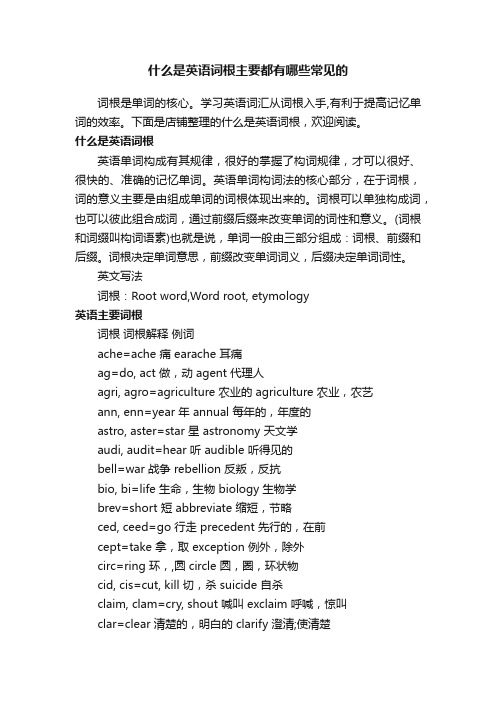
什么是英语词根主要都有哪些常见的词根是单词的核心。
学习英语词汇从词根入手,有利于提高记忆单词的效率。
下面是店铺整理的什么是英语词根,欢迎阅读。
什么是英语词根英语单词构成有其规律,很好的掌握了构词规律,才可以很好、很快的、准确的记忆单词。
英语单词构词法的核心部分,在于词根,词的意义主要是由组成单词的词根体现出来的。
词根可以单独构成词,也可以彼此组合成词,通过前缀后缀来改变单词的词性和意义。
(词根和词缀叫构词语素)也就是说,单词一般由三部分组成:词根、前缀和后缀。
词根决定单词意思,前缀改变单词词义,后缀决定单词词性。
英文写法词根:Root word,Word root, etymology英语主要词根词根词根解释例词ache=ache 痛 earache 耳痛ag=do, act 做,动 agent 代理人agri, agro=agriculture 农业的 agriculture 农业,农艺ann, enn=year 年 annual 每年的,年度的astro, aster=star 星 astronomy 天文学audi, audit=hear 听 audible 听得见的bell=war 战争 rebellion 反叛,反抗bio, bi=life 生命,生物 biology 生物学brev=short 短 abbreviate 缩短,节略ced, ceed=go 行走 precedent 先行的,在前cept=take 拿,取 exception 例外,除外circ=ring 环,,圆 circle 圆,圈,环状物cid, cis=cut, kill 切,杀 suicide 自杀claim, clam=cry, shout 喊叫 exclaim 呼喊,惊叫clar=clear 清楚的,明白的 clarify 澄清;使清楚clud, clus=close, shut 关闭 exclude 排除,排斥,拒绝接纳cogn=know 知道 cognition 认知cord=heart 心 cordial 衷心的,诚心的corpor, cor=body 体 corporation 团体,社团cred=believe, trust 相信,信任 credibility 可信,可靠,cruc=cross 十字 crucify把……钉在十字桇上;折磨cur=care 关心,挂念,注意 security 安全cur, curs, cour, cours=run 跑 cruise巡航舰di=day 日 diary 日记dit=give 给 editdict,dic=say 言,说 dictator 独裁者,口授者duc, duct=lead 引导 conduct 引导,指导,经营ed=eat 吃 edible 可以吃的,食用的ev=age 年龄,时代 longevity 长寿,长命fact, fac=do, make 做,作 factory 工厂fer=bring, carry 带,拿 different 不同的,相异的flor, olour=flower 花 florid 如花的,华丽的flu=flow 流 fluency 流利,流畅fus=pour 灌,流,倾泻 refuse 拒绝,拒受geo=earth 地 geography 地理学gon=angle角 trigon 三角形grad=step, go, grade 步,走,级 gradual 逐步的gram=write 写 telegram 电报graph=write, writing 写,画 photograph 照相,拍照gress=go, walk 行走 progress 进步hap=chance,luck,accident 机会,偶发happen 发生,巧遇hibit=hold 拿,持 exhibit 展出,展览hospit, hosp=guest 客人 hospitable 好客的idio=particular, own, private, proper 特殊的,个人的,专有的idiom 惯用语,方言insul=island 岛 insular 岛的,偏狭的it=go 行走 exit 出口,退出ject=throw 投掷 projection 投掷,发射lect, leg, lig=choose, gather 选,收 elect 选举lev=raise 举、升 elevate 抬起,使升高liber=liberty 自由 liberation 解放lingu=language 语言 linguist 语言专家liter=letter 文字,字母 literate 识字的,有文化的loc=place 地方 local 当地的log=speak 言,说 dialogue 对话loqu=speak 言说 eloquent 有口才的,雄辩的lun=moon 月亮 lunar 月亮的,似月的manu, man=hand 手 manuscript 手稿mar=sea 海 marine 海上的,航海的medi=middle 中间 mediate 居中调解,调停memor=memory,mindful 记忆,记住的memory 记忆,记忆力milit=soldier 兵 military 军事的,军队的mini=small,less 小 minimum 最小数mir=wonder 惊奇,惊异 admire 赞赏,钦佩mort=death 死 mortal 终有一死的mot=move 移动 motion 运动,动nomin=name 名 nominal 名义上的,有名无实的nov=new 新 novel 新的,新奇的numer=number 数 numeral 数字,[语]数词oper=work 工作 operation 手术,工作,操作ori=rise 升起 orient 东方,东方的paci=peace 和平 pacify 使和平,抚慰past=feed 喂,食 pasture 放牧、牧场,吃草pel=push, drive 推,逐,驱 propel 推动pend, pens=hang 悬挂 pendent 悬空的,悬而未决的pet=seek 追求 compete 竞争,比赛(pet:走 impetus 推动,促进)phon=sound 声音 phone 电话plen=full 满,全 plenty 大量,丰富pone=put 放置 postpone 推后,推迟popul=people 人民 population 人口,全体居民port=carry 拿,带,运 import 输入,进口pos=put 放置 expose 揭露,揭发preci=price 价值 precious 宝贵的,珍贵的pur=pure 清,纯 purify 使纯净rect=right, straight 正,直 correct 改正,纠正rupt=break 破 rupture 破裂,使裂开sal=salt 盐 salary 薪水sci=know 知 science 科学sec, sequ=follow 跟随 sequence 继续,连续sect=cut 切割 section 切开,一部分sent, sens=feel 感觉 sentiment 感情,思想感情son=sound 声音 sonic 声音的,音速的spect=look 看 spectate 出席,观看spir=breathe 呼吸 inspire 鼓舞,吸入tail=cut 切,割 tailor 裁缝,成衣商tain, ten=hold 握,持,守 contain 容纳,包含,内装tect=cover 掩盖 detect 侦查,发觉tempor=time 时 temporary 暂时的,临时的tend, tens=draw 拉 tension 拉紧,引力tent, tract=draw 拉,抽,引 tractor 拖拉机urb=city 城市 suburb 郊区,近郊ut=use 用 utility 效用, 有用vac, vacu=empty 空 vacancy 空白,空虚vad, vas=walk, go 行走 invasion 入侵,侵略vari=change 变化 variable 可变的,反复的ven=come 来 convene 召集(会议),集会vert, vers=turn 转 subvert 推翻,颠覆vi, via=way 路 via 取道,经由vis, vid=see 看 visible 可见的,看得见的vit=life 生命 vital 充满活力的viv=live 活 vivid 活泼的,有生气的英语词根前缀形式开放分类:英语、语法、学习、词汇[prefix]以结合形式出现,与一词、词根或短语开头的一个音或连续几个音相接,或书写中一个字母或连续几个字母用以产生出派生词或变化形式。
(完整版)英语构词法(常用的词根词缀总结)
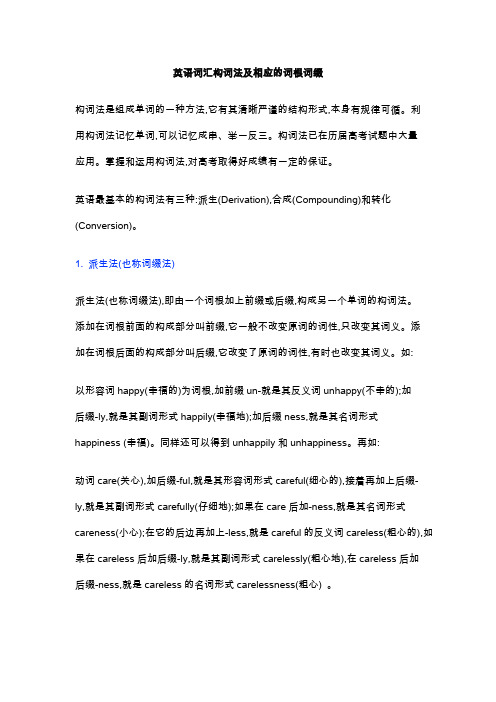
英语词汇构词法及相应的词根词缀构词法是组成单词的一种方法,它有其清晰严谨的结构形式,本身有规律可循。
利用构词法记忆单词,可以记忆成串、举一反三。
构词法已在历届高考试题中大量应用。
掌握和运用构词法,对高考取得好成绩有一定的保证。
英语最基本的构词法有三种:派生(Derivation),合成(Compounding)和转化(Conversion)。
1. 派生法(也称词缀法)派生法(也称词缀法),即由一个词根加上前缀或后缀,构成另一个单词的构词法。
添加在词根前面的构成部分叫前缀,它一般不改变原词的词性,只改变其词义。
添加在词根后面的构成部分叫后缀,它改变了原词的词性,有时也改变其词义。
如:以形容词happy(幸福的)为词根,加前缀un-就是其反义词unhappy(不幸的);加后缀-ly,就是其副词形式happily(幸福地);加后缀ness,就是其名词形式happiness (幸福)。
同样还可以得到unhappily和unhappiness。
再如:动词care(关心),加后缀-ful,就是其形容词形式careful(细心的),接着再加上后缀-ly,就是其副词形式carefully(仔细地);如果在care后加-ness,就是其名词形式careness(小心);在它的后边再加上-less,就是careful的反义词careless(粗心的),如果在careless后加后缀-ly,就是其副词形式carelessly(粗心地),在careless后加后缀-ness,就是careless的名词形式carelessness(粗心) 。
前缀、后缀是构词的要素,具有一定的作用和意义。
懂得了前后缀的含义,就容易了解由前(后)缀和词根结合而成的单词的意义。
现把英语中我们常见的前后缀列举如下:1)前缀anti-反对: antisocial反社会的auto-自: automobile小汽车,autonomy自治bi-双: biannual 一年两次的, bicycle自行车by-在旁:bystander 旁观者, by-product副产品co- 同: co-operation合作,co-existence共处,co-worker同事counter-反:counter-attack反攻,counter-revolutionary反革命的dis-否定,除去: discover发现,disorder混乱,杂乱en-使成为: enable使能够,enslave奴役, encourage鼓励extra-外: extraordinary非常的,格外的for-,fore-,先,前,预: forward向前,foresee 预见,forearm前臂,foretaste先尝for-禁,弃: forbid禁止,forget忘记,forgo放弃in-,il-,im-,ir-不,非: informal非正式的,incomplete不完全的,indefinite不定的, illegal非法的,immoral不道德的,irregular不规则的inter-间,相互:internationalism国际主义,interview会见micro-微: microscope显微镜,microfilm微型胶片mid-中:midday 中午,midnight夜半,mid-autumn中秋的mis-误: misunderstand 误会,misuse误用,misfortune不幸non-非,不:non-moral非道德范围内的,nonsense胡言,nonexistent不存在的post-后于: postwar战后的pre-先于: prewar战前的re-重,再,复: rewrite重写, return返回, review复习super-上,超: superman超人,supermarket 超级商场tele-远: telephone电话,telescope望远镜,television电视un-不: unable不能的,unimportant不重要的,untrue不真实的vice-副:vice-chairman副主席,vice-premier副总理2)后缀-age状态,集合: marriage婚姻, shortage缺少,village 村庄-an人: American美国人,Italian意大利人,意大利籍,African 非洲人-ation,-ition动作,状态:determination决心,industrialization工业化,preparation 准备,competition竞争,repetition重复-dom状态,领界: freedom自由,kingdom王国-eer人: engineer工程师,volunteer志愿者-er人,动作者:fighter战士,worker工人,writer作家,thinker思想家,harvester收割机-ese人,语言:Chinese中国人,中文, Japanese日本人,日文-ess女性:actress女演员,princess公主,goddess女神-hood身分,境遇,状态: childhood 童年,womanhood女性-ian人: musician音乐家, guardian卫护者, Christian基督教徒-ism主义,教:communism共产主义,socialism社会主义,revisionism修正主义-ist主义者,人: communist共产主义者, artist 艺术家-ity (抽象名词): possibility 可能性, ability能力,equality平等-man人: Englishman英国人,英格兰人, postman邮递员-ment运动,结果: movement运动,development发展,judgement判断-ness状态,性质:kindness和善,carefulness小心,correctness正确,tiredness疲倦-or人,动作者: actor男演员,visitor访问者-ship状态,身份: friendship友谊,comradeship同志之友谊,sportsmanship 体育道德,hardship苦难-sion动作,状态: tension紧张状态,revision修订-tion动作,状态: attention注意,action行动-less无:fearless 无所畏惧的,careless 不小心的,useless 无用的,meaningless 无意义的-ly品质,的: comradely 同志般的, friendly 友好的, weekly 每星期的-some引起,适于,易于: troublesome 烦人的,tiresome 令人感到厌倦的2. 合成法(也称复合法) 把两个单词或两个以上的词合成一个新词,这种构词的方法叫做合成法。
英语单词词根、前缀、后缀大总结
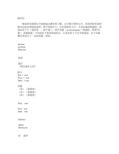
构词法一般读者对我国汉字的构造法都有所了解。
汉字属于拼形文字。
英语科技术语的构词法也有类似的道理。
所不同的在于:它们是拼音文字,不是由偏旁构成的,而是由若干个(通常是一,两个或三,四个词素(word elem ents)构成的。
所谓“词素”,是指构成一个词的各个基本组成单位,它是由若干个音节构成的。
各个词素都有其语言上一定的来源。
例如:pr ewarpost warInter war战前战后(两次战争之间)拆字Pre + w arP ost + wa rIn ter + war词源(拉)(条顿语)(拉)(条顿语)(拉)(条顿语)Prae wa rP ost warInte r w ar(be fore)(a fter)(be tween)前战争后战争之间战争上面这三个词:prewa r, po stwar, int erwar拆出来的p re, p ost,inter, war都是词素。
这里面的“war”,叫做词根(root)。
由于“w ar”这个词根是从条顿语(Te utoni c)演变而来的,所以也称为条顿词根(Te utoni c roo t)。
同样地,如果一个词根是从拉丁语或希腊语来的。
便称为拉丁词根(La tin r oot)或希腊词根(Greek root)。
凡是词根,都有其本身的含义。
例如这个war字,其本身的含义是“战争”。
上面那些pre-, pos t-, i nter-, 叫做前缀(pre fix),是放到词根的前面,和词根结合起来构成一个派生词。
除了前缀外,还有后缀(suff ix)。
英语构词法归纳和总结
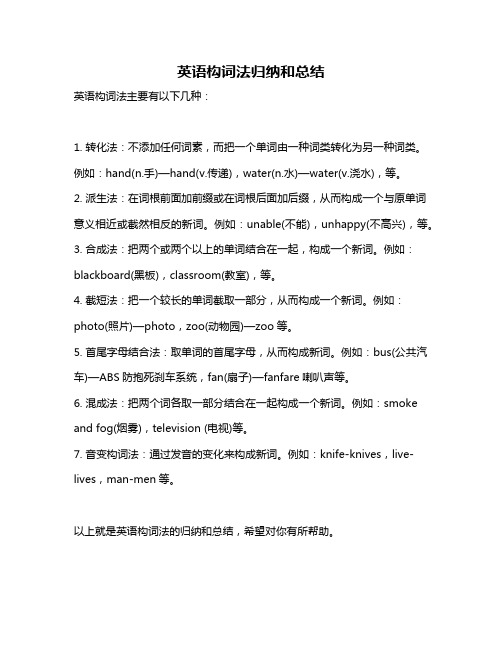
英语构词法归纳和总结
英语构词法主要有以下几种:
1. 转化法:不添加任何词素,而把一个单词由一种词类转化为另一种词类。
例如:hand(n.手)—hand(v.传递),water(n.水)—water(v.浇水),等。
2. 派生法:在词根前面加前缀或在词根后面加后缀,从而构成一个与原单词意义相近或截然相反的新词。
例如:unable(不能),unhappy(不高兴),等。
3. 合成法:把两个或两个以上的单词结合在一起,构成一个新词。
例如:blackboard(黑板),classroom(教室),等。
4. 截短法:把一个较长的单词截取一部分,从而构成一个新词。
例如:photo(照片)—photo,zoo(动物园)—zoo等。
5. 首尾字母结合法:取单词的首尾字母,从而构成新词。
例如:bus(公共汽车)—ABS防抱死刹车系统,fan(扇子)—fanfare喇叭声等。
6. 混成法:把两个词各取一部分结合在一起构成一个新词。
例如:smoke and fog(烟雾),television (电视)等。
7. 音变构词法:通过发音的变化来构成新词。
例如:knife-knives,live-lives,man-men等。
以上就是英语构词法的归纳和总结,希望对你有所帮助。
英语构词法-(完整版)
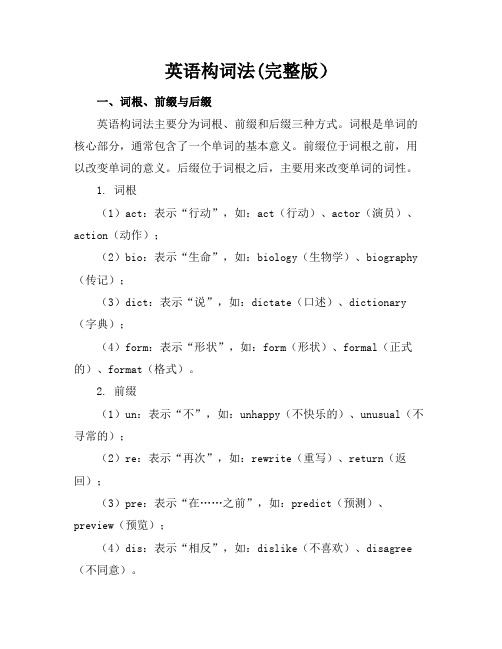
英语构词法(完整版)一、词根、前缀与后缀英语构词法主要分为词根、前缀和后缀三种方式。
词根是单词的核心部分,通常包含了一个单词的基本意义。
前缀位于词根之前,用以改变单词的意义。
后缀位于词根之后,主要用来改变单词的词性。
1. 词根(1)act:表示“行动”,如:act(行动)、actor(演员)、action(动作);(2)bio:表示“生命”,如:biology(生物学)、biography (传记);(3)dict:表示“说”,如:dictate(口述)、dictionary (字典);(4)form:表示“形状”,如:form(形状)、formal(正式的)、format(格式)。
2. 前缀(1)un:表示“不”,如:unhappy(不快乐的)、unusual(不寻常的);(2)re:表示“再次”,如:rewrite(重写)、return(返回);(3)pre:表示“在……之前”,如:predict(预测)、preview(预览);(4)dis:表示“相反”,如:dislike(不喜欢)、disagree (不同意)。
3. 后缀(1)ness:表示“状态”,如:happiness(幸福)、sadness (悲伤);(2)ful:表示“充满”,如:hopeful(充满希望的)、careful(小心翼翼的);(3)ly:表示“副词”,如:quickly(迅速地)、slowly(慢慢地);(4)tion:表示“动作、状态”,如:action(动作)、invention(发明)。
二、合成法与派生法在英语构词法中,除了词根、前缀和后缀,还有合成法和派生法两种重要的构词方式。
这些方法丰富了英语词汇,使得表达更加精确和多样。
1. 合成法(1)名词+名词:如:snowfall(降雪)、bookstore(书店);(2)名词+形容词:如:worldwide(全世界的)、citywide(全市的);(3)形容词+形容词:如:darkblue(深蓝色的)、lightgreen (浅绿色的);(4)动词+副词:如:lookup(查阅)、takeover(接管)。
六大英语构词法详解
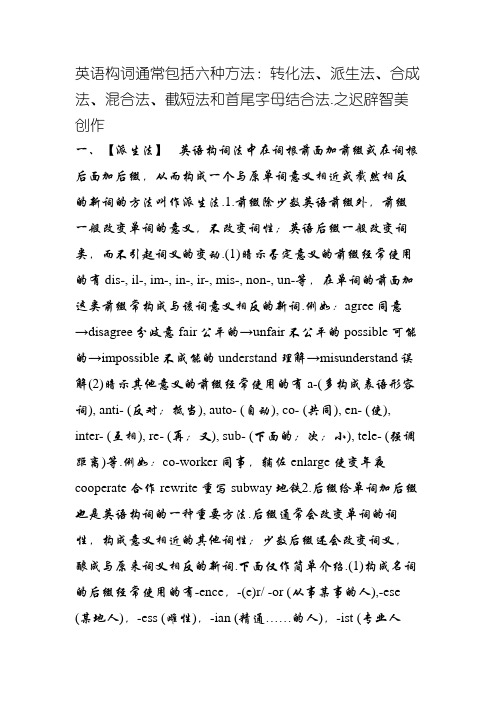
英语构词通常包括六种方法:转化法、派生法、合成法、混合法、截短法和首尾字母结合法.之迟辟智美创作一、【派生法】英语构词法中在词根前面加前缀或在词根后面加后缀,从而构成一个与原单词意义相近或截然相反的新词的方法叫作派生法.1.前缀除少数英语前缀外,前缀一般改变单词的意义,不改变词性;英语后缀一般改变词类,而不引起词义的变动.(1)暗示否定意义的前缀经常使用的有dis-, il-, im-, in-, ir-, mis-, non-, un-等,在单词的前面加这类前缀常构成与该词意义相反的新词.例如:agree同意→disagree分歧意fair公平的→unfair不公平的possible可能的→impossible不成能的understand理解→misunderstand误解(2)暗示其他意义的前缀经常使用的有a-(多构成表语形容词), anti- (反对;抵当), auto- (自动), co- (共同), en- (使), inter- (互相), re- (再;又), sub- (下面的;次;小), tele- (强调距离)等.例如:co-worker 同事,辅佐enlarge 使变年夜cooperate 合作rewrite 重写subway 地铁2.后缀给单词加后缀也是英语构词的一种重要方法.后缀通常会改变单词的词性,构成意义相近的其他词性;少数后缀还会改变词义,酿成与原来词义相反的新词.下面仅作简单介绍.(1)构成名词的后缀经常使用的有-ence,-(e)r/ -or (从事某事的人),-ese (某地人),-ess (雌性),-ian (精通……的人),-ist (专业人员),-ment (性质;状态),-ness (性质;状态),-tion(举措;过程)等.例如:differ分歧于→dif ference区别write写→writer作家China中国→Chinese中国人act饰演→actress 女演员music音乐→musician音乐家(2)构成动词的后缀经常使用的有-(e)n (多用于形容词之后),-fy (使……化),-ize (使……成为).例如:wide→widen加宽beauty→beautify美化pure→purify提纯real→realize意识到organ→organize组织sharp→sharpen使变锋利(3)构成形容词的后缀经常使用的有-al,-able (有能力的),-(a)n(某国人的),-en (多用于暗示资料的名词后),-ern (方向的),-ese(某国人的),-ful,-(ic)al,-ish,-ive,-less (暗示否定),-like (像……的),-ly,-ous,-some,-y (暗示天气)等.例如:nature自然→natural自然的reason事理→reasonable有事理的America美国→American美国的China中国→Chinese中国人的gold金子→golden金的east东→eastern西方的child孩子→childish孩子气的snow雪→snowy雪的(4)构成副词的经常使用后缀有-ly (主要用于形容词之后暗示方式或水平),-ward(s) (主要用于暗示方位的词之后暗示方向).例如:angry生气的→angrily 生气地to到→towards朝……,向……east西方→eastward 向东(5)构成数词的后缀有-teen (十几),-ty (几十),-th (构成序数词).例如:six六→sixteen十六→sixteenth第十六four四→forty四十→fortieth第四十二、【合成法】英语构词法中把两个单词连在一起合成一个新词,前一个词修饰或限定后一个词,这样的方法就是合成法.1.合成名词名词+名词weekend周末名词+动词daybreak黎明名词+动名词handwriting书法名词+及物动词+er/or pain-killer止痛药名词+介词+名词sister-in-law嫂子代词+名词she-wolf母狼动词+名词typewriter打字机动名词+名词reading-room阅览室现在分词+名词flying-fish飞鱼形容词+名词freshman年夜一新生副词+动词outlook景色,风光介词+名词afterbrain后脑2.合成形容词名词+形容词bloodred血红的名词+现在分词French-speaking 讲法语的名词+to+名词one-to-one一对一的名词+过去分词man-made人造的数词+名词one-way单行道的数词+名词+形容词three-year-old三岁的数词+名词+ed ten-storeyed十层的动词+副词one-off 一次性的形容词+名词high-quality高质量的形容词+名词+ed noble-minded高尚的形容词+形容词light-green浅绿色的形容词+现在分词ordinary-looking相貌一般的副词+形容词ever-green常青的副词+现在分词hard-working辛勤的副词+过去分词well-known著名的副词+名词fast-food专门提供快餐服务的介词+名词indoor室内的3.合成动词名词+动词sleep-walk梦游形容词+动词white-wash粉刷副词+动词overwhelm压倒,制服4.合成副词形容词+名词hotfoot慌忙地形容词+副词everywhere处处副词+副词however尽管如此介词+名词beforehand事先介词+副词forever永远5.合成代词代词宾格+self herself 她自己物主代词+self myself 我自己形容词+名词anything 一切6.合成介词副词+名词outside 在……外面介词+副词within在……之内副词+介词into进入三、【转化法】英语构词法中把一种词性用作另一种词性而词形不变的方法叫作转化法,有的名词可以作动词,有的形容词可以作副词或动词.1.动词转化为名词1)意思没有变动,例如:I think we'd better finish the talk now.我想我们的谈话最好现在结束.2)意思有一定变动,例如:He is a man of strong build.他是一个体格健壮的汉子.3)构成短语,例如:Let's have a look first. 我们先看一下吧.2.名词转化为动词1)暗示物体的,如:Have you booked the ticket?你订好票了吗?2)暗示身体部位的,如:Hand in your papers please.请把你们的试卷交上来.3)暗示一类人的,如:She nursed her husband back to health.她看护丈夫,使他恢复了健康.4)笼统名词,如:We breakfasted together.我们在一起吃了早餐.3.形容词转化为动词少数形容词可以转化为动词.例如:We will try our best to better our living conditions.我们要尽力改善我们的生活状况.4.副词转化为动词有少数副词可以转化为动词.例如:Murder will out.恶事终势必败事.5.形容词转化为名词1)暗示颜色的形容词常可转化为名词,如:The girl in black appears very beautiful.那个穿黑衣服的女孩子看上去非常漂亮.2)一些形容词如old, young, poor, rich, wounded, injured等与the连用,暗示一类人,作主语时,谓语用复数,如:We don't belong to the rich, but we dong't belong to the poor either. 我们不是有钱人,但我们也不是穷人.四、【截短法(缩略法)】将单词缩写,词义和词性坚持不变的英语构词法称为截短法,主要有截头、去尾、截头去尾等形式.1.截头telephone→phoneairplane→plane2.去尾mathematics→mathsexamination→examkilogram→kilolaborat ory→labtaxicab→taxi3.截头去尾influenza→flurefrigerator→fridgeprescription→script五、【混合法(混成法)】英语构词还可以将两个词混合或各取一部份紧缩而成一个新词,前半部份表属性,后半部份表主体.这样的英语构词法就是混合法.newsbroadcast→newscast新闻广播television broadcast→telecast 电视广播smoke and fog→smog烟雾photo andgraphy→photography摄影,摄影术helicopterairport→heliport直升飞机场六、【首尾字母缩略法】用单词首尾字母组成一个新词的英语构词法叫做首尾字母缩略法.这种形式的英语构词生成的新词,读音主要有两种形式,即各字母分别读音;作为一个单词读音.Testing of English as a ForeignLanguage→TOEFL托福Teach English as a Foreign Language→TEFLTeach English as a SecondLanguage→TESLGraduate Record Examination→GRE美国研究生入学考试1、名词: 可数(1)掌握名词复数形式的构成①直接在词尾 + s(boys, pencils)②以ch, sh, s, x结尾的 + es(watches, buses)③以“辅音字母+ y”结尾的, 变y为i + es(families, cities)④以f, fe结尾的, 变f, fe为v + es(knives, leaves)⑤不规则变动(children, women, fish, tomatoes)注意①单复数同形的名词: sheep, Chinese, Japanese.②只有复数形式的词: people, trousers, clothes, thanks.(2)掌握名词的所有格的两种暗示法①有生命的人或植物的所有格常在单词后边加's②无生命的事物的所有格用of.my mother's bag the dog's house the door of our classroom注意, 加's构成所有格时, 如果名词自己是以s结尾的则只加', 不加s.(3)不成数名词①不成数名词没有复数形式, 且前边不能用不定冠词, 也不能用数词作定语.②作主语时, 谓语动词用双数形式.③使用量词短语暗示数量.a piece of news a cup of tea2、冠词(1)掌握不定冠词a和an的用法用在第一次提到的可数名词双数前或泛指一类人或物及固定词组中.(2)掌握定冠词the的用法①用来特指某人或某物.②用在世界上唯一无二的事物的名称前.③用在序数词和形容词最高级前.④用在姓氏的复数形式前, 暗示夫妇或一家人.⑤某些词组中的固定搭配.3、代词(1)分清人称代词的主格和宾格的用法①主格在句子中作主语.②宾格在句子中作宾语.(2)分清形容性物主代词和名词性物主代词的用法①形容词性物主代词后边必需跟着它所修饰的名词.②名词性物主代词后边不能再跟名词.(3)反身代词的构成和用法反身代词在句中主要起强调作用, 词组有teach oneself, learn by oneself(4)掌握以下不定代词的基本用法①some——一些.经常使用于肯定句, 可修饰可数名词和不成数名词.any——一些, 任何.经常使用于任何否定句, 疑问句条件句中, 可修饰可数名词和不成数名词.注意与some或any组合生成的词(something, somebody, someone, anything, anybody, anyone), 其用法与some和any基秘闻同.②each——可独自使用, 强调个体, 用于两者或两者以上的每个人或物, 可作名词和形容词使用.every——不成独自使用, 强调整体, 用于三者或以上的情况, 只能作形容词用.③both, all, neither, none, either, any, the other的区别.含义对象都都不任何(一个) 每(一个) 另(一个)two both neither either each the otherthree all none any every another(5)初步掌握it用来暗示自然现象、时间、距离及作形式主语或形式宾语的用法.It's 3 o'clock in the afternoon.It's about 5 kilometres away.It's raining now.It's important to learn English well.You'll find it easy to make a kite.4、数词(1)掌握基数词和序数词的构成及基本用法.注意以下几个序数词的写法:first, second, third, fifth, eighth, ninth, twelfth, twentieth, thirty-first one hundredth(2)掌握千以内数字的写法:8, 231 eight thousand two hundred and thirty-one(3)掌握年、月、日的表达法及日常交际用语中数字的表达法:(on) August seventh, 1979; page 58; Unit25; Class Three Grade One; the No.168 Middle School(4)掌握下列词组的用法:hundreds of, thousands of, millions of, three hundred students 5、形容词和副词(1)形容词和副词的原级、比力级和最高级的构成及使用.①原级: 没有比力用原级, 特定句型用原级(as…as, not as…as, not so…as).②比力级: 两者比力用比力级, 句中有"A or B"句型或than.③最高级: 三者或三者以上比力用最高级, 句中有"A, B or C"句型或由in或of引出比力范围.④其它表达法: 比力级 + and + 比力级表“越来越……”, The + 比力级, the + 比力级表“越……越……”eg: ①Mike is tall.This room is as big as that one.This lesson isn't as interesting as lesson Three.Tom doesn't run so fast as Jack.②Which is better, this one or that one?My sister writes more carefully than my brother.③Who is the tallest, Jack, John or Tom?He is the most careful in our class.Changjiang River is the longest river in China.④Spring is coming. It's getting warmer and warmer.The barder he studied, the more knowledge he got.⑤形容词副词比力级和最高级的构成a、直接 + er / + estb、以e结尾的 + er / + estc、以辅音字母 + y结尾的变y为i + er / + estd、重读闭音节以一个辅音字母结尾的, 双写 + er / + este、不规则变动f、多音节和少数双音节的词, 在词前加more或most(2)易混的副词辨析:①already, 多用于肯定句, yet多用于否定句或疑问句中②too, also, either都暗示“也”too和also都用于肯定句中, too常放在句尾, also常放在句中, either用于否定句的句尾.6、介词(1)暗示时间的介词in, on, atin——用于较长一段时间, 星期, 月份, 季节, 年, 朝代世纪或非特指的早、午、晚等.on——具体某一天或具体某一个早、午、晚.at——在某一点时间或某个瞬间.eg: in 1988, in the 21st century, in winter, in March, in the moring, on Saturday evening, on the May seventh, on a windy night, on the afternoon, of October 31st, at eight o'clock, at night, at noon, at the end of, at this moment, at this time, at the age of (2)in与after暗示“以后”时的区别in——暗示以现在为起点的“以后”, 经常使用于将来时态中. after——经常使用于一般过去时态中, 暗示在过去某个时间之后.eg: We'll come back in two weeks.我们将在两周后回来. They came back after two weeks.两周以后, 他们回来了. (3)ago与before暗示“在……以前”时的区别ago——暗示从现在算起的“以前”, 经常是“一段时间+ ago”before——暗示以过去为起点的“以前”时, 经常是“一段时间+ before”, 如果是:”“before + 一点时间”, 则只暗示在某一点以前.eg: He went to the library 2 hours ago.He said he had gone to the library 2 hours before.They will start before eight o'clock tomorrow morning.I went to bed before nine yesterday evening.(4)for与duringfor + 一段时间常暗示“继续了一段时间”, 而during则暗示在……期间eg: He has been in Beijing for 3 years.I was in Beijing during last summer.(5)in与at暗示方位时at——与小的地址连用, 有“在某一点”的含义.in——与年夜的处所连用有“在…范围之内”的含义.He was lost at the station.The twins were born in a big city.(6)over, above与on暗示“在……上”的区别.over——指没有接触面的正上方, 反义词是under. above——指没有接触面的上方, 在高一些的位置, 反义词是below.on——指有接触面的, 在……的概况上.The plane is above the clouds.The bridge is over the river.The cup is on the table.(7)熟练掌握介词与动词、名词、形容词搭配构成的词组, 另外还要注意, 介词的后边要跟名词作它的宾语, 如果是动词, 则要酿成动名词(doing)的形式.如: She is good at singing.I'm good at English.7、连词(1)掌握连词的含义与用法and(和, 并), but(可是), or(否则, 或者), so(所以, 于是),when(当……的时候), either…or(或者……或者, 不是……就是), neither…nor(既不……也不……), so…that(如此……以致于……)8、动词(1)熟练掌握动词的现在分词, 第三人称双数, 过去式, 和过去分词的构成.注意牢记不规则动词的过去式和过去分词.(2)掌握四类动词的一般用法:①实义动词——分为及物和不及物两种, 在句中作谓语.②连系动词——be, look, feel, get, turn, become, keep等, 在句中与表语一起构成相当于谓语部份的系表结构.③助动词——帮手谓语动词构成份歧的时态和否定句, 疑问句, 不能独自使用, 也无含义.④情态动词——可以说是一种特殊的助动词, 情态动词没有人称和数的变动, 后边必需跟动词原形, 而且自己不单有含义而且可以直接构成否定句和疑问句.(3)非谓语动词的习惯用法, 一定要熟记1)begin to do sth 2)start to do sth3)decide to do sth 4)want to do sth5)(would) like to do sth 6)forget to do sth7)remember to do sth 8)love to do sth9)learn to do sth 10)need to do sth11)try to do sth 12)try not to do sth13)stop to do sth 14)ask sb.to do sth15)ask sb.not to do sth 16)like sb.to do sth17)teach sb.to do sth 18)tell sb.to do sth19)tell sb.to do sth 20)want sb.to do sth21)help sb.(to) do sth 22)let sb.do sth23)have sb.do sth 24)make sb.do sth25)had better do sth 26)had better not do sth27)feel / hear sb.do sth 28)watch / see sb.do sth29)why not do sth 30)be busy doing sth31)see / watch sb doing sth 32)feel / hear sb doing sth 33)enjoy doing sth 34)finish doing sth35)keep (sb) doing sth 36)go on doing sth37)stop doing sth 38)like doing sth39)begin doing sth 40)start doing sth41)prevent sb from doing 42)stop sb / sth from doing sth43)spend时间 / 金钱(in) doing sth 44)It takes sb. some time to do sth.45)It is good (wrong, easy, difficult, important…) to do sth46)It is time (for sb.) to do sth 47)be used for doing sth48)will / would you please do sth 49)what about (doing) sth (4)能够区别使用下列动词1)tell, say, speak, talk2)bring, take, carry3)lend, borrow, keep4)listen, listen to, hear, hear from, hear of5)look, look at, see, watch, notice6)reach, arrive(in / at), get to7)look for, look after, look at, look up8)put on, put up, put down, put away, put into9)look for, find, find out, found10)take off, take away, take down11)try on , put on, wear, dress, get dressed12)ask for, send for13)get back, give back, take back14)be made in, be made of, be made from, be made by15)get on, got off, get into, get out of16)get in, get up, get on…with17)go down, go on, go out18)look out, look out of19)turn on, turn off, turn up, turn down, turn to, turn over20)send out, sent to , send away, send up, send for21)fill…with… be full of… be filled with…23)be in, be out, be away, be over, be up24)wear out, sell out25)worry about the worried about26)cost, pay, spend, take(5)注意延续性动词(段动词)与瞬间动词(点动词)在用法上的区别.瞬间动词有: join, buy, come, go, leave, arrive, begin, start, open, closed, become, borrow, lend, die, get等.记住: 瞬间动词(点动词)不能与暗示继续一段时间的时间状语连用.。
英语构词法 一些常用的词缀和词根
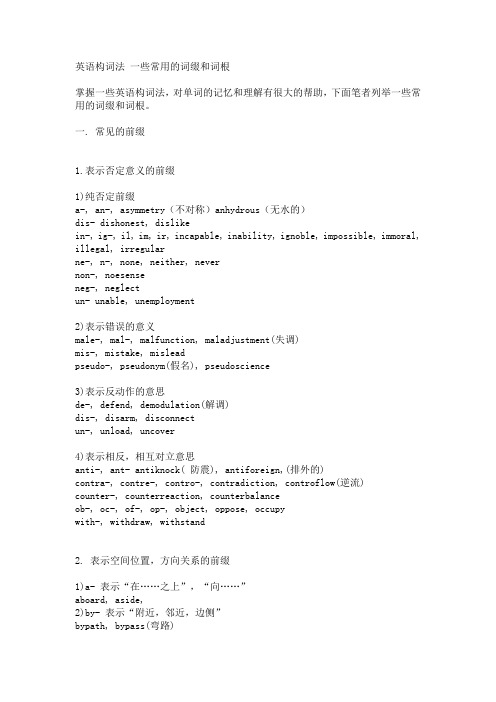
英语构词法一些常用的词缀和词根掌握一些英语构词法,对单词的记忆和理解有很大的帮助,下面笔者列举一些常用的词缀和词根。
一. 常见的前缀1.表示否定意义的前缀1)纯否定前缀a-, an-, asymmetry(不对称)anhydrous(无水的)dis- dishonest, dislikein-, ig-, il, im, ir, incapable, inability, ignoble, impossible, immoral, illegal, irregularne-, n-, none, neither, nevernon-, noesenseneg-, neglectun- unable, unemployment2)表示错误的意义male-, mal-, malfunction, maladjustment(失调)mis-, mistake, misleadpseudo-, pseudonym(假名), pseudoscience3)表示反动作的意思de-, defend, demodulation(解调)dis-, disarm, disconnectun-, unload, uncover4)表示相反,相互对立意思anti-, ant- antiknock( 防震), antiforeign,(排外的)contra-, contre-, contro-, contradiction, controflow(逆流)counter-, counterreaction, counterbalanceob-, oc-, of-, op-, object, oppose, occupywith-, withdraw, withstand2. 表示空间位置,方向关系的前缀1)a- 表示“在……之上”,“向……”aboard, aside,2)by- 表示“附近,邻近,边侧”bypath, bypass(弯路)3)circum-, circu-, 表示“周围,环绕,回转”circumstance, circuit4)de-, 表示“在下,向下”descend, degrade5)en-, 表示“在内,进入”encage, enbed(上床)6)ex-, ec-, es-, 表示“外部,外”exit, eclipse, expand, export7)extra-, 表示“额外”extraction (提取)8)fore- 表示“在前面”forehead, foreground9)in-, il-, im-, ir-, 表示“向内,在内,背于”inland, invade, inside, import10)inter-, intel-, 表示“在……间,相互”international, interaction, internet11)intro-, 表示“向内,在内,内侧”introduce, introduce12)medi-, med-, mid-, 表示“中,中间”Mediterranean, midposition13)out-, 表示“在上面,在外部,在外”outline, outside, outward14)over-, 表示“在上面,在外部,向上”overlook, overhead, overboard15)post-, 表示"向后,在后边,次”postscript(附言),16)pre-, 表示"在前”在前面”prefix, preface, preposition17)pro-, 表示“在前,向前”progress, proceed,18)sub-, suc-, suf-, sug-, sum-, sup-, sur-, sus-, 表示“在下面,下”subway, submarine, suffix, suppress, supplement19)super-, sur-, 表示“在…..之上”superficial, surface, superstructure20)trans-, 表示“移上,转上,在那一边”translate, transform, transoceanic21)under-, 表示“在…..下面,下的”underline, underground, underwater22)up-, 表示“向上,向上面,在上”upward, uphold, uphill(上坡)3. 表示时间,序列关系的前缀1)ante-, anti-, 表示“先前,早于,预先”antecedent, anticipate,2)ex-, 表示“先,故,旧”expresident, exhu我的好友and3)fore-, 表示“在前面,先前,前面”foreward, dorecast, foretell(预言)4)mid-, medi-, 表示“中,中间”midnight, midsummer5)post-"表示“在后,后”postwar,6)pre-, pri-, 表示“在前,事先,预先”preheat, prewar, prehistory7)pro-, 表示“在前,先,前”prologue(序幕),prophet(预言家)8)re-, 表示“再一次,重新”retell, rewrite4. 表示比较程度差别关系的前缀1)by-, 表示“副,次要的”byproduct, bywork(副业)2)extra-,表示“超越,额外”extraordinary,3)hyper- 表示“超过,极度”hypersonic(超声波), hypertesion(高血压)4)out-,表示“超过,过分”outdo(超过), outbid(出价过高的人)5)over-,表示“超过,过度,太”overeat, overdress, oversleep6) sub-, suc-, sur-, 表示“低,次,副,亚”subeditor, subordinate, subtropical(亚热带)7)super-, sur- 表示“超过”supernature, superpower, surplus, surpass8)under-,表示“低劣,低下”undersize, undergrown, underproduction(生产不足)9)vice- 表示“副,次”vicepresident, vicechairman5. 表示共同,相等意思的前缀1)com-, cop-, con-, cor-, co- 表示“共同,一起”。
- 1、下载文档前请自行甄别文档内容的完整性,平台不提供额外的编辑、内容补充、找答案等附加服务。
- 2、"仅部分预览"的文档,不可在线预览部分如存在完整性等问题,可反馈申请退款(可完整预览的文档不适用该条件!)。
- 3、如文档侵犯您的权益,请联系客服反馈,我们会尽快为您处理(人工客服工作时间:9:00-18:30)。
英语单词构词法(1)前缀1.表示否定意义的前缀1)纯否定前缀a-, an-, asymmetry(不对称)anhydrous(无水的)dis- dishonest, dislikein-, ig-, il, im, ir, incapable, inability, ignoble, impossible, immoral, illegal, irregular ne-, n-, none, neither, nevernon-, nonsenseneg-, neglectun- unable, unemployment2)表示错误的意义male-, mal-, malfunction, maladjustment(失调)mis-, mistake, misleadpseudo-, pseudonym(假名), pseudoscience3)表示反动作的意思de-, defend, demodulation(解调)dis-, disarm, disconnectun-, unload, uncover4)表示相反,相互对立意思anti-, ant- antiknock( 防震), antiforeign,(排外的)contra-, contre-, contro-, contradiction, controflow(逆流)counter-, counterreaction, counterbalanceob-, oc-, of-, op-, object, oppose, occupywith-, withdraw, withstand2. 表示空间位置,方向关系的前缀1)a- 表示“在……之上”,“向……”aboard, aside,2)by- 表示“附近,邻近,边侧”bypath, bypass(弯路)3)circum-, circu-, 表示“周围,环绕,回转”circumstance, circuit4)de-, 表示“在下,向下”descend, degrade5)en-, 表示“在内,进入”encage, enbed(上床)6)ex-, ec-, es-, 表示“外部,外”exit, eclipse, expand, export7)extra-, 表示“额外”extraction (提取)8)fore- 表示“在前面”forehead, foreground9)in-, il-, im-, ir-, 表示“向内,在内,背于”inland, invade, inside, import10)inter-, intel-, 表示“在……间,相互”international, interaction, internet11)intro-, 表示“向内,在内,内侧”introduce, introduce12)medi-, med-, mid-, 表示“中,中间”Mediterranean, midposition13)out-, 表示“在上面,在外部,在外”outline, outside, outward14)over-, 表示“在上面,在外部,向上”overlook, overhead, overboard15)post-, 表示"向后,在后边,次”postscript(附言),16)pre-, 表示"在前”在前面”prefix, preface, preposition17)pro-, 表示“在前,向前”progress, proceed,18)sub-, suc-, suf-, sug-, sum-, sup-, sur-, sus-, 表示“在下面,下”subway, submarine, suffix, suppress, supplement19)super-, sur-, 表示“在…..之上”superficial, surface, superstructure20)trans-, 表示“移上,转上,在那一边”translate, transform, transoceanic21)under-, 表示“在…..下面,下的”underline, underground, underwater22)up-, 表示“向上,向上面,在上”upward, uphold, uphill(上坡)3. 表示时间,序列关系的前缀1)ante-, anti-, 表示“先前,早于,预先”antecedent, anticipate,2)ex-, 表示“先,故,旧”expresident, exhusband3)fore-, 表示“在前面,先前,前面”foreward, dorecast, foretell(预言)4)mid-, medi-, 表示“中,中间”midnight, midsummer5)post-"表示“在后,后”postwar,6)pre-, pri-, 表示“在前,事先,预先”preheat, prewar, prehistory7)pro-, 表示“在前,先,前”prologue(序幕),prophet(预言家)8)re-, 表示“再一次,重新”retell, rewrite4. 表示比较程度差别关系的前缀1)by-, 表示“副,次要的”byproduct, bywork(副业)2)extra-,表示“超越,额外”extraordinary,3)hyper- 表示“超过,极度”hypersonic(超声波), hypertension(高血压)4)out-,表示“超过,过分”outdo(超过), outbid(出价过高的人)5)over-,表示“超过,过度,太”overeat, overdress, oversleep6) sub-, suc-, sur-, ??表示“低,次,副,亚”subeditor, subordinate, subtropical(亚热带)7)super-, sur- 表示“超过”supernature, superpower, surplus, surpass8)under-,表示“低劣,低下”undersize, undergrown, underproduction(生产不足)9)vice- 表示“副,次”vicepresident, vicechairman5. 表示共同,相等意思的前缀1)com-, cop-, con-, cor-, co- 表示“共同,一起”。
connect, combine, collect, combat, coexist, co-operate2)syn-, syl-,sym-,表示“同,共,和,类”symmetry, sympathy, synthesis(合成)6. 表示整个完全意思的前缀1)al- 表示“完整,完全”alone, almost,2) over-表示“完全,全”overall, overflow(充满)3) pan-表示“全,总,万”panentheism(泛神论),panorama7. 表示分离,离开意思的前缀1)a- ab-, abs-,表示“分离,离开”away, apart, abstract, abstain2)de- 表示“离去,处去”depart, decolour,3)dis-, di-, dif-, 表示“分离,离开”divorce, disarm(缴械)4)ex-, e-, 表示“离开,分离”expel, exclude, expatriate(驱出国外)5)for- 表示“离开,脱离”forget, forgive6)表示“离开”release, resolve7)表示“分离,隔离”separate, seduce, select8. 表示通过,遍及意思的前缀1)dia-,表示“通过,横过”diameter, diagram,2)per-, pel-, 表示“通,总,遍”perfect, perform, pervade(浸透)3)trans-, 表示“横过,贯通”transparent, transmit, transport9. 表示加强意思的前缀a-, arouse, ashamedad-, adjoin, adhere( 粘着)10. 表示变换词类作用的前缀be-, befriend,en-, enslave, enable, enrichad-, ac-, af-, ag-, an-, ap-, ar-, as-, at-, adapt, accord, affix, aggression, arrive, assist, attend, attract, arrange, assign(委派) 11. 表示数量关系的前缀1)表示“单一”,“一”mon-, mon-, monotone(单调),monopoly, monarchuni-, un-, uniform, unicellular(单细胞)2)表示“二,两,双”ambi-, ambiguous, amphibian(两栖类)bi-, bin- bicycle, di-, diode(二级管),twi-, twilight3)表示“十”deca, deco-, dec- deci-, decade, decimals4)表示"百,百分子一"?hecto-, hect-, hectometer,centi-, centimeter5)表示"千,千分子一”kilo-, kilometer6)表示"万,万分子一”myria-, myri-, myriametremega-, meg-, megabytemicro-, microvolt (微伏特)7)表示"许多,复,多数”multi-, mult-, multipmetre (万用表)poly-, polysyllable,8)表示“半,一半”hemi-, hemispheredemi-, demiofficialsemi-, semiconductor, semitransparentpene-, pen-, peninsula12. 表示特殊意义的前缀1)arch-, 表示“首位,第一的,主要的”architect, archbishop2)auto-, 表示“自己,独立,自动”automobile, autobiography3)bene-, 表示“善,福”benefit4)eu-, 表示“优,美好”eugenics(优生学),euphemism5)male-, mal- 表示“恶,不良”maltreatment, malodor,6)macro-, 表示“大,宏大”macroscopic(宏观)7)magni-, 表示“大”magnificent8)micro-, 表示“微”microscope13. 表示术语的前缀1)aud-, 表示“听,声”audience,2)bio-, 表示“生命,生物”biography(传记)3)ge-, 表示“地球,大地”geography4)phon-, 表示“声,音调”phonograph5)tele-, 表示“远离”television, telephone英语单词构词法(2)后缀1. 名词后缀(1) 具有某种职业或动作的人1)-an, -ain, 表示"……地方的人,精通……的人”American, historian,2)-al, 表示"具有……职务的人" principal,3)-ant,-ent, 表示"……者”merchant, agent, servant, student,4)-ar, 表示"……的人”scholar, liar, peddler5)-ard, -art, 表示"做……的人”coward, laggard, braggart(夸张者)6)-arian, 表示"……派别的人,……主义的人”humanitarian, vegetarian7)-ary, 表示"从事……的人" secretary, missionary8)-ant, 表示"具有……职责的人" candidate, graduate9)-ator, 表示"做……的人" educator, speculator(投机者)10)-crat, 表示"某种政体,主义的支持者" democrat, bureaucrat11)-ee, 表示"动作承受者" employee, examinee12)-eer, 表示"从事于……人" engineer, volunteer13)-er, 表示"从事某种职业的人, 某地区,地方的人" banker, observer, Londoner, villager14)-ese, 表示" ……国人,…..地方的人”Japanese, Cantonese15)-ess, 表示"阴性人称名词,actress, hostess, manageress16)-eur, 表示"……家”amateur, littérateur17)-ian, 表示"……地方人,信仰…….教的人,从事……职业的人”Christian, physician(内科医生),musician18)-ician, 表示"精通者,……家,”electrician, magician, technician19)-icist, 表示"……家,…….者, …….能手”physicist, phoneticist, technicist20)-ic, 表示"……者,……师" mechanic, critic21)-ie, 表示"爱,指小" dearie, auntie, lassie(小姑娘)22)-ier, 表示"从事……职业”cavalier, clothier, brazier(黄铜匠)23)-ine, ian, 表示"阴性人称" heroine, ballerina24)-ist, 表示"从事……研究者,信仰……主义者" pianist, communist, dentist, artist, chemist25)-ive, 表示"动作者,行为者”native, captive26)-logist, 表示"……学家,研究者" biologist, geologist(地质学家)27)-or, 表示"……者" author, doctor, operator,28)-ster, 表示"做…….事情的人”youngster, gamester(赌徒),songster29)-yer, 表示" 从事……职业者”lawyer(2). 构成,具有抽象名词的含义1)-acy, 表示"性质,状态,境遇" accuracy, diplomacy2)-age, 表示"状态,行为,身份及其结果,总称" courage, storage, marriage3)-al,???? a) 表示"事物的动作,过程”refusal, arrival, survival, denial, approvalb) 表示具体的事物manual, signal, editorial, journal4)-ance, -ence表示"性质,状况,行为,过程,总量,程度”endurance, importance, diligence, difference, obedience5)-ancy, -ency, 表示"性质,状态,行为,过程" frequency, urgency, efficiency,6)-bility, 表示"动作,性质,状态" possibility, feasibility,7)-craft, 表示"工艺,技巧”woodcraft, handicraft, statecraft(治国策)8)-cracy, 表示"统治,支配" bureaucracy, democracy9)-cy, 表示"性质,状态,职位,级别" bankruptcy(破产),supremacy10)-dom, 表示"等级,领域,状态" freedom, kingdom, wisdom11)-ery, -ry, 表示"行为,状态,习性" bravery, bribery, rivalry12)-ety, 表示"性质,状态”variety, dubiety(怀疑)13)-faction, -facture, 表示"作成,……化,作用" satisfaction, manufacture14)-hood, 表示"资格,身份, 年纪,状态" childhood, manhood, falsehood15)-ice, 表示"行为,性质,状态" notice, justice, service16)-ine, 表示"带有抽象概念" medicine, discipline, famine17)-ing, 表示"动作的过程,结果" building, writing, learning18)-ion, -sion, -tion, -ation, -ition, 表示"行为的过程,结果,状况" action, solution, conclusion, destruction, expression, correction19)-ise, 表示"性质,状态”exercise, merchandise(商业)20)-ism, 表示"制度,主义,学说,信仰,行为" socialism, criticism, colloquialism, heroism21)-ity, 表示"性质,状态,程度”purity, reality, ability, calamity22)-ment, 表示"行为,状态,过程,手段及其结果treatment, movement, judgment, punishment, argument23)-mony, 表示"动作的结果,状态" ceremony, testimony24)-ness, 表示"性质,状态,程度" goodness, kindness, tiredness, friendliness25)-or, -our, 表示"动作,性质,状态" favor, error,26)-osity, 表示"动作,状态”curiosity27)-ship, 表示"情况,性质,技巧,技能及身份,职业”hardship, membership, friendship28)-th, 表示"动作,性质,过程,状态" depth, wealth, truth, length, growth29)-tude, 表示"性质,状态,程度" latitude, altitude(海拔)30)-ure, 表示"行为,结果" exposure, pressure, failure, procedure(手续),31)-y, 表示"行为的结果,状态,性质”glory, history, victory, inquiry(3) 带有场所,地方的含义1)-age, 表示"住所,地点" village, cottage2)-ary, 表示"住所,场地" library, granary (谷仓)3)-ery, ry, 表示"工作场所,饲养所,地点" laundry, nursery, surgery(手术室)4)-ory, 表示"工作场所,住处" factory, dormitory, laboratory, observatory(4) 带有学术,科技含义1)-grapy, 表示"……学,写法”biography, calligraphy, geography2)-ic, ics, 表示"……学……法" logic, mechanics, optics, electronics3)-ology, 表示"……学……论”biology, zoology, technology(工艺学)4)-nomy, 表示"……学……术" astronomy, economy, bionomy(生态学)5)-ery, 表示"学科,技术" chemistry, cookery, machinery6)-y, 表示"……学,术,法”photography, philosophy(5) 表示人和事物的总和,集合含义1)-age, baggage, tonnage2)-dom, newspaperdom(新闻界)3)-hood, neighbourhood, womanhood4)-ery, cavalry, ministry(内阁)5)-ure, legislature, judicature(6) 表示物品和物质名称的含义1)-ant, ent, solvent, constant2)-al, signal, pictorial(画报)3)ar, collar, pillar(石柱)4)- er, boiler, computer, washer, cooker5)-ery, drapery(绸缎)6)-ing, clothing, matting,7)-ment, instrument, equipment, attachment(7) 表示“细小”的含义1)-cle, particle,2)-cule, molecule(分子)3)-el, parcel4)-en, chicken, maiden5)-et, pocket, ticket6)-etta, -ette, etto, cigarette, essayette(短文)7)-kin, napkin8)-ling, duckling,9)-let, booklet10)-y, baby, doggy2. 形容词后缀(1)带有“属性,倾向,相关”的含义1)-able, -ible, movable, comfortable, applicable, visible, responsible2)-al, natural, additional, educational3)-an, ane, urban, suburban, republican4)-ant, -ent, distant, important, excellent5)-ar, similar, popular, regular6)-ary, military, voluntary7)-ice, -atie, ical, politic, systematic, historic, physical,8)-ine, masculine, feminine, marine9)-ing, moving, touching, daring10)-ish, foolish, bookish, selfish11)-ive, active, impressive, decisive12)-ory, satisfactory, compulsory13)-il, -ile, -eel, fragile, genteel(文雅的)(2) 表示“相象,类似”的含义1)-ish, boyish, childish2)-esque, picturesque3)-like, manlike, childlike4)-ly, manly, fatherly, scholarly, motherly5)-some, troublesome, handsome6)-y, milky, pasty(3) 表示“充分的”含义1)-ful, beautiful, wonderful, helpful, truthful2)-ous, dangerous, generous, courageous, various3)-ent, violent,(4) 表示由某种物质形成,制成或生产的含义1)-en, wooden, golden, woolen2)-ous, gaseous3)-fic, scientific(5) 表示方向的含义1)-ern, eastern, western2)-ward, downward, forward(6) 表示“倍数”的含义1)-ble, double, treble2)ple, triple3)-fold, twofold, tenfold(7) 表示“数量关系”的含义1)-teen, thirteen2)-ty, fifty3)-th, fourth, fiftieth(8) 表示国籍,语种,宗教的含义1)-an, Roman, European2)-ese, Chinese,3)-ish, English, Spanish(9) 表示“比较程度”的含义1)-er, greater2)-ish, reddish, yellowish3)-est, highest4)-most, foremost, topmost(10)其他的含义-less, 表示否定,countless, stainless, wireless3. 动词后缀1)-ize, ise, 表示"做成,变成,……化“modernize, mechanize, democratize, organize2)-en, 表示"使成为,引起,使有”quicken, weaken, soften, harden3)-fy, 表示"使……化, 使成”beautify, purify, intensify, signify, simplify4)-ish, 表示"使,令”finish, abolish, diminish, establish5)-ate, 表示“成为……,处理,作用”separate, operate, indicate4. 副词后缀1)-ly, possibly, swiftly, simply2)-ward, -wards, downward, inwards, upward3)-ways, always, sideways4)-wise, otherwise, clockwise英语单词构词法(3)词根1) aer, ar, 含义是“空气,大气”aeroplane, aerial,2) ag, act, ig, 含义是“做,动作”active, agent, reaction,3) alt, 含义是“高”,altitude,4) alter, altern, altr, 含义是“其它,变更”alternate,5) bio, bi, bion, 含义是“生物,生命”biology, bionics(仿生学)6) brev, bri, brief, 含义是“短”brief, abbreviation, abridge(节略)7) cap, capt, cept, cip, 含义是“取,获”capture, except, concept, capacity8) ced, ceed, cess, 含义是“行,让步”proceed, succeed, excess(过度)9) centr, centr, 含义是“中心”concentrate, eccentric(偏心的)10) clain, clam, 含义是“呼喊”claim, proclaim, exclaim11) clos, clud, 含义是“闭合”conclude, enclose, include12) col, cult, 含义是“耕耘”colony, cultivate, agriculture13) cor, cord, 含义是“心”cordial, record, accord14) curr, cur, cour, 含义是“跑,动作”current, occur, concurrence(同时发生)15) dic, dict, 含义是“说,示”dictate, edit, indicate, predict16) doc, doct, 含义是“教”doctor, document17) duc, duct含义是“引导,传导”introduce, produce, conduct, deduct( 推论)18) fact, fac, fect, dic, dit, 含义是“做,创造”factory, effect, profit, faculty, perfect19) fend, fens, 含义是“打,击”defence, offence20) fer, 含义是“搬运,移转”ferry, transfer, defer(迟延)21) fin, finit, 含义是“终,极”final, finish, confine22) firm, 含义是“坚固”firm, confirm, affirm(断定)23) fix, 含义是“固定”prefix, affix(附加)24) flect, flex, 含义是“弯曲”flexible, reflex25) flor, flour, flower, 含义是“花”flower, flourish26) form, 含义是“形”uniform, formula, transform, reform, deform27) forc, fort, 含义是“力,强度”force, enforce, effort28) gen, genit, 含义是“生产,发生”generate, generation29) gram, graph, 含义是“书写,记录”telegram, diagram, photograph30) grad, gress, gred, gree, 含义是“步,阶段”gradually, degree, progress31) hab, habit, hibit, 含义是“保持,住”inhabit, exhibit, prohibit32) her, hes, 含义是“粘附”adhere, cohesion33) ject, jet, 含义是“抛射”project, inject34) jour, 含义是“日,一天”journal(日记), journey, adjourn(延期)35) jug, junct, 含义是“结合,连合”conjunction, junction(连合)36) labour, labor, 含义是“劳动,工作”labourer, elaborate, collaborate37) lect, leg, lig, 含义是“挑选,采集”collect, select, lecture38) lif, liv, 含义是“生活,生存”life, alive, live39) loc, 含义是“场所,位置”location, dislocate(脱位)40) long, leng, ling, 含义是“长的”length, prolong, linger41) loqu, locut, 含义是“说话”colloquial, eloquent,42) mand, mend, 含义是“命令”command, demand, recommend43) man, manu, 含义是“手,手法”manage, manual44) memor, menber, 含义是“记忆”memory, remember, memorial45) mind, ment, 含义是“心”mind, remind, mental46) merc, merch, 含义是“贸易”commerce, merchant47) meas, mens, meter, metr, 含义是“测量,度量”measure, meter, diameter48) min, 含义是“小”diminish, minority49) miss, mit, 含义是“派遣,送”mission, dismiss, transmit, missile50) mob, mot, mov, 含义是“动”movement, motion, mobile, remove51) nect, nex, 含义是“捆扎”connect, disconnect, annex(合并)52) not, 含义是“记号,注意”note, denote, annotation(注释)53) onom, onym, 含义是“名字”synonym, antonym, anonymous54) pair, par, 含义是“a)相同,对等b)准备”compare, prepare55) pel, puls, 含义是“追逐”expel, impel(推进)56) pend, pens, pond, 含义是“悬挂”depend, independent, expense(支付)57) phon, 含义是“声音”symphony, telephone, microphone58) plac, 含义是“位置,场所”place, replace59) peopl, popul, publ, 含义是“人民,民众”public, republic, popular, people60) port, 含义是“搬运”export, import, deport(输送)61) press, 含义是“压,压制”pressure, express, oppress, impression62) prob, proof, prov, 含义是“实验,验证”prove, approve,63) quer, quest, quir, quis, 含义是“寻找,探问”inquiry, question, inquisition(调查,追究)64) rang, rank, 含义是“排列”arrange, rank,65) rect, right, rig, 含义是“正,直”correct, direct, erect66) riv, 含义是“河流,流远”,river, arrive, derive67) rupt, 含义是“破坏,毁坏”eruption, bankrupt, corruption68) sci, 含义是“认识,知识”science, conscious69) scrib, script, 含义是“书写,记录”describe, script70) sens, sent, 含义是“感觉,情感”sensation, sentiment71) sign, 含义是“标记,符号”signal, signature, design72) sembl, simil, 含义是“相似,类似”similar, resemble, assimilate(同化)73) soci, 含义是“结合,社交”social, association74) spec, spect, spitc, spis, 含义是“看,视”inspect, spectator, conspicuous, respect75) struct, 含义是“建筑,构造”structure, construct, instruct, destruction76) tect, teg, 含义是“遮蔽,掩盖”detect, protect77) temp, tens, 含义是“时间,时机”tense, contemporary, temporal78) tend, tes, tent, 含义是“倾向, 伸张”tendency, intension, extend, intend79) test, 含义是“证明,证实”testify, protest, contest(争论)80) text, 含义是“编织,构成”textile, texture, context81) tract, trail, 含义是“拖拉,吸引”attract, tractor, abstract, contract(收缩)82) tribut, 含义是“给予”contribution, distribute83) us, ut, 含义是“用,使用”usable, utilize, abuse84) vac, van, 含义是“空,虚”vacancy, vanity, evacuate(清空)85) vad, vas, wad, 含义是“走,去”invade, wade, evade(逃避)86) vers, vert, 含义是“旋转,反转”convert, inversion(倒转),reverse, divert(使转向)87) vid, vis, vey, view, 含义是“观看,看见”television, visible, evident, interview, survey88) viv, vit, 含义是“生,活”vivid, vital, survival,89) war, ward, 含义是“注意,保护”aware, wary(谨慎),ward(守护)90) way, 含义是“路”way, away, subway, always英语单词常见词根总结ag,act 做,驱动agent代理人active活动的,积极的agr 农田agriculture农业agrarian田地的am 爱,亲爱amicable友善的amiable和蔼可亲的anim 心灵,精神,生命animal动物animate有生命的ann,enn 年annual一年的centennial一世纪的astro 星astronomy天文学astronaut宇宙航行员audi 听audience听众audible听得见的bell 战争rebellion反叛,反抗bellicose好战的bio 生命,生物biology生物学antibiotic抗生的,抗生素brev 短brevity 简短abbreviate缩短,节略cede 走precedent先行的,在前的precede先行cent 百centimeter厘米centigrade百分度的center,centr 中心concentrate集中centrifugal离心力的cide,cis 杀,切suicide自杀bactericide杀菌剂claim,clam 叫喊exclaim惊叫proclaim宣布,宣告clar 清楚,明白declare表明,声明clarify讲清楚clud,clos 关闭close关闭exclude排斥cogn 知道recognize承认cognitive认识的cord 心cordial衷心的core核心cosm 宇宙,世界osmic宇宙的cosmos宇宙cred 相信credibility可信credit信任cur,cours 跑ccurrence出现,发生current流通的cycl 圆,环bicycle自行车cyclone旋风di 日diary日记diarist记日记者dict 说predict预言indicate表示duc,duct 引导conduct指导induce引诱ed 吃edible可吃的edacity贪吃fact 做,制factory工厂manufacture制造,加工fer 带,拿transfer转移ferry渡船flu 流fluent流利的influenza流行性感冒form 形式,外形transform改变formula公式fract,frag破,折fraction碎片fragile易碎的fus 倾,注,溶化fusion熔解effuse泻出gen 起源generate使产生genetic遗传的geo 地球,土地geography地理geology地质学grad 步,走,级gradual逐步的graduate毕业gram 写,记录diagram图表program节目单,方案graph 写,画,记录photograph照像autograph亲笔,手稿gress 行走progress进步retrogress后退hap 机会,运气,偶发happen发生mishap灾祸hospit 客人hospital医院hospitable好客的,殷勤的insul 岛peninsula半岛insulation隔绝,孤立hydra 水hydraulic水利的hydrant消防栓ject 投,掷,抛eject射出project投射junct 连接,结合conjunction连接词adjunct附属物lect,leg,lig 挑选,采集lect 选举selection选举eligible合格的,合适的lev 举,升elevator电梯lever杠杆liber 自由liberate解放liberalist自由主义的lingu 语言linguist语言学家bilingual两种语言的liter 文字,字母literate识字的literature文学loc 地方local当地的locate使座落于log 词,语言,讲演dialogue对话logic逻辑loqu 说话eloquent雄辩的colloquial口语的,会话的manu 手manuscript手稿manual手的,用手的medi 中间medium中等的mediation居中调解memor 记忆,记住的memory记忆memorial纪念日,纪念物milit 兵military军事的militant战斗性的min 少,小inority少数diminish减少,减小mob,mot,mov 移动mobile活动的motion运动immovable不可移动的mort 死亡mortal终有一死的mortician承办殡葬的人nov 新novel小说novelty新奇numer 数numeral数字的numerous为数众多的oper 工作operate操作co operate合作opt 视线,光线optic视力的optics光学path 感情,苦楚,疾病sympathy同情pathetic可怜的pel 推,逐,驱expel驱逐repel击退,反击,抵抗pend,pen 悬挂depend依靠pendent悬空的phon 声音microphone扩音器telephone电话plen 满,全plenty充足,大量plentitude丰富,充足pon,pos 放置postpone推迟position位置popul 人民population人口popular人民的,大众的port 搬运,带portable可携带的porter搬运工人prim 第一,首要primary最初的primitive原始的psych 精神psychology心理学psychic精神的pur 清,纯,净purify使纯净depurate使净化rect 正,直erect直立的correct改正rid,ris 笑ridicule嘲笑derision笑柄,嘲笑rupt 破rupture破裂,裂开interrupt中断scend,scens,scent 爬ascend上,升descent下降sci 知道science科学conscious有知觉的sens,sent 感觉sensation感觉sentiment感情sol 太阳solar太阳的parasol阳伞spec 看spectacle光景,景象prospect展望spir 呼吸,生命conspire共谋inspire吸气,鼓舞tact,tang,tag 接触intact未接触的tangible可接触的tail 切,割tailor裁缝retail零售tain,ten,tin 保持,握,容纳contain容纳obtain取得,sustain支持tect 掩,盖detect侦察发觉,detective侦探的tele 远telescope望远镜telegram电报tend,tens,tent 伸extend伸开,扩展extensive广阔的text 编织textile纺织的texture组织,结构therm 热thermal热的thermometer温度计tor,tort 扭,扭转orsion扭转distortion歪曲tract 拖,拉,吸引attract吸引attractive有吸引力的un,uni 一unite统一,联合union联合,工会ut 用utility有用utilize利用vac,van 空,空虚vacation假期vanity空虚,虚荣vari 变化various各样的variant变异的,不同的ven 来intervene干预,介入prevent防止vert,vers 转adverse相反的convert转换vid,vis 看见evident明显的visible可见的vit,viv 生活,生存vital生命的survival幸存volv 滚动revolve旋转involve卷入wis,wit 知道wisdom智慧witty机敏的。
